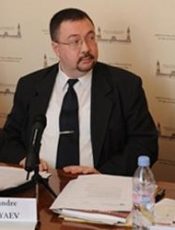The International Tribunal for Cambodia started a historical trial on November 21st. This is a second and key process for which the tribunal itself was established: the case against the members of Pol Pot`s government. Pot himself died in 1998, but his major aides are now facing trial. They are former head of state Khieu Samphan, 80; former Foreign Minister Ieng Sary, 86; Nuon Chea, 85, who used to be the Khmer Rouge’s second-highest leader after Pol Pot… Just a week before the trial, a fourth defendant, the Khmer Rouge's social affairs minister, the 79-year-old Ieng Thirith, was ruled unfit to stand trial because of Alzheimer's disease. All the defendants are charged with crimes against humanity, grave breaches of the Geneva Conventions of 1949, genocide, religious persecution, homicide and torture. The International Tribunal for Cambodia was established in 2006. Its staff includes both Cambodian and international experts, prosecutors and judges. By now, the tribunal has tried just one case, convicting the Khmer Rouge commandant of Cambodia's Tuol Sleng prison Kaing Guek Eav for war crimes, crimes against humanity and other offenses. Last year he was sentenced to 35 years in prison, shortened to 19 years because of time served and in compensation for a period of illegal detention by a military court, the New York Times reports.
The first day of the trial aginst three senior surviving Khmer Roger leaders was spent by the court reading out half of the indictment. It says that the former leaders of the Pol Pot regime breached not only Cambodian criminal law but he international legislation as well. Among other charges, the former ministers are accused of ordering executions of members of the Lon Nol regime, which had been installed in 1970. Nevertheless, the indictment claims that many executions were 'unintentional', as a result of the defendants` neglect. Other charges include deporation of people, mainly the Vietnamese, illegal imprisoning and torture of tens of thousands of citizens, maltreatment of Buddhist monks and the Cham people. The indictment also blames the Khmer Rouge-controlled Democratic Kampuchea Socialist organization (which ruled Cambodia in 1975-1979) for an unprecedented genocide campaign which led to annihilation of about 20% of the country's population. The defendants deny all the charges.

(Oh photo, left to right: Nuon Chea, Khieu Samphan, Ieng Sary, Ieng Thirith – major defendants in Case №002 of the International Tribunal for Cambodia)
It must be mentioned that unlike media reports claiming that the Khmer Rouge regime is blamed for a genocide against its own nation, the court`s indictment tells us about the extermination of the Vietnamese people, not the Khmer (who make nealry 5% of Cambodian population). Also, unlike newspaper articles which say that the Khmer Rouge movement persecuted everyone who they believed was unloyal to their ideology, the indictment gives cautious statements, which describe the victims of the regime as people who 'died of starvation and malnutrition caused by the Socialist policies'. A few weeks which preceded the beginning of the process were quite tense for both the court and the UN which, actually, established the tribunal. Media reports appeared in July saying that the UN asked international judges working for the Tribunal to stop further investigation into the Khmer Rouge crimes. Although the UN denied the reports as false, the way things unfolded further proved that some difficulties did take place. In October the court ruled out that Andrew Cayley, co-prosecutor of Cambodia's Khmer Rouge Tribunal, should recall his request for further investigation. The court said that Cayley had violated the principle of confidentiality, but the prosecutor responded by saying that he had been guided by another principle which is about informing the public on how the court proceedings were going on. Human Rights Watch then demanded the resignation of two judges (a Cambodian and a foreigner) responsible for investigating possible new cases. Cambodia`s Foreign Minister said that it is up to his country, and not the international tribunal, to decide whether to hold further investigation or not. A few days later, German judge Siegfried Blunk, responsible for indictments of Khmer Rouge war crimes suspects at Cambodia's UN-backed tribunal resigned, alleging government interference in the investigation. So, we see that the Cambodian authorities had been trying to control the court`s procedures, while the Tribunal`s aim is to maintain independence. A conflict of interest is obvious. In view of this, it should be stressed that the current Prime Minister of Cambodia, Hun Sen, has been in office for more than 25 years already, after serving as a foreign minister for the Democratic Republic of Kampuchea starting from 1979! And prior to that, he was among the Khmer Rouge leaders. That is why further investigation may have tragic consequences for Hun Sen as well as for many of his allies. One should not rule out that the financing for the Tribunal was approved only in hope for unseating the longest-ruling Asian leader, who is just 59.
All existing international tribunals, especially those established for this or that country, are being used as a tool for external interference into a state`s home policies, sometimes rather diplomatically, and sometimes in a more dictatorial way. Look at the Tribunal for the former Yugoslavia, Rwanda, Lebanon. Cambodia is not an exception… It means that the way things will unfold at the International Tribunal for Cambodia will demonstrate not just its ability to find out the truth about the Khmer Rouge regime of 1975-1979 but will also determine the future of Cambodia, at least its political future.









